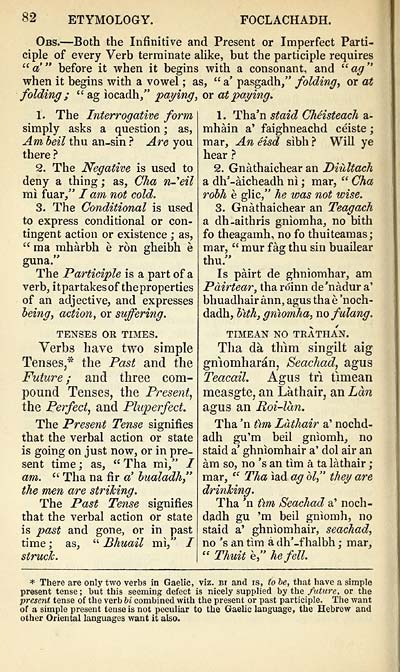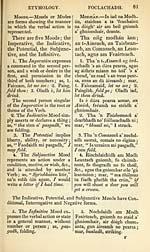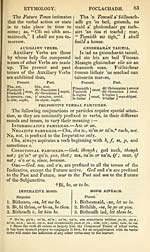Books and other items printed in Gaelic from 1841 to 1870 > Stéidhean a' Ghràmair Ghaëlig
(110) Page 82
Download files
Complete book:
Individual page:
Thumbnail gallery: Grid view | List view

82 ETYMOLOGY.
FOCLACHADH.
Obs. — Both the Infinitive and Present or Imperfect Parti-
ciple of every Verb terrainate alike, but the participle requires
" a'" before it when it begins with a consonant, and "ag"
when it begins with a vowel ; as, " a' pasgadh," folding, or at
folding ; " ag ìocadh," paying, or atpaying.
t. The Interrogative form
simply asks a question ; as,
Am beil thu an-sin ? Are you
there ?
2. The Negative is used to
deny a thing ; as, Cha n-eil
mì fuar," / am not cold.
3. The Conditional is used
to express conditional or con-
tingent action or existence ; as,
"raa mhàrbh è ròn gheibh è
guna."
The Participle is a part of a
verb, itpartakesof theproperties
of an adjective, and expresses
òeing, action, or suffering.
TENSES OR TIMES.
Verbs have two simple
Tenses,* the Past and the
Future ; ancl three com-
pound Tenses, the Present,
the Perfect, and Pluperfect.
The Present Tense signifies
that the verbal action or state
is going on just now, or in pre-
sent time ; as, " Tha mì," /
am. " Tha na fir a' bualadh,"
the men are striking.
The Past Tense signifies
that the verbal action or state
is past and gone, or in past
time ; as, " Bhuail mì," /
struclc.
1. Tha'n staid Chèisteach a-
mhàin a' faighneachd cèiste ;
mar, An èisd sìbh ? Will ye
hear ?
2. Gnàthaichear an Diùltach
a dh'-àicheadh nì ; mar, " Cha
robh è gHc," he was not wise.
3. Gnàthaichear an Teagach
a dh-aithris gnìomha, no bith
fo theagamh, no fo thuiteamas ;
mar, " mur fàg thu sin buailear
thu."
Is pàirt de ghnìomhar, am
Pàirtear, tha rdinn de'nàdur a'
bhuadhair ànn, agus tha è 'noch-
dadh, bìth, gnìomha, no fulang.
TIMEAN NO TRÀTHAN.
Tha dà thìm singilt aig
gnìomharàn, Seachad, agus
Teacail. Agus trì tìmean
measgte, an Làthair, an Làn
agus an Roi-làn.
Tha 'n tìm Làthair a' nochd-
adh gu'm beil gnìomh, no
staid a' ghnìomhair a' dol air an
àm so, no 's an tìm à ta làthair ;
mar, " Tha ìad ag òl," they are
drinJcing.
Tha 'n tim Seachad a' noch-
dadh gu 'm beil gnìomh, no
staid a' ghnìomhair, seachad,
no 's an tìm à dh'-f halbh ; mar,
" Thuit è," hefell.
* There are only two verbs in Gaelic, viz. Br and is, to be, that have a simple
present tense ; but this seeming defect is nicely supplied by the future, or the
present tense of the verb bi combined with the present or past participle. The want
of a simple present tense is not peculiar to the Gaelic language, the Hebrew and
other Oriental languages want it also.
FOCLACHADH.
Obs. — Both the Infinitive and Present or Imperfect Parti-
ciple of every Verb terrainate alike, but the participle requires
" a'" before it when it begins with a consonant, and "ag"
when it begins with a vowel ; as, " a' pasgadh," folding, or at
folding ; " ag ìocadh," paying, or atpaying.
t. The Interrogative form
simply asks a question ; as,
Am beil thu an-sin ? Are you
there ?
2. The Negative is used to
deny a thing ; as, Cha n-eil
mì fuar," / am not cold.
3. The Conditional is used
to express conditional or con-
tingent action or existence ; as,
"raa mhàrbh è ròn gheibh è
guna."
The Participle is a part of a
verb, itpartakesof theproperties
of an adjective, and expresses
òeing, action, or suffering.
TENSES OR TIMES.
Verbs have two simple
Tenses,* the Past and the
Future ; ancl three com-
pound Tenses, the Present,
the Perfect, and Pluperfect.
The Present Tense signifies
that the verbal action or state
is going on just now, or in pre-
sent time ; as, " Tha mì," /
am. " Tha na fir a' bualadh,"
the men are striking.
The Past Tense signifies
that the verbal action or state
is past and gone, or in past
time ; as, " Bhuail mì," /
struclc.
1. Tha'n staid Chèisteach a-
mhàin a' faighneachd cèiste ;
mar, An èisd sìbh ? Will ye
hear ?
2. Gnàthaichear an Diùltach
a dh'-àicheadh nì ; mar, " Cha
robh è gHc," he was not wise.
3. Gnàthaichear an Teagach
a dh-aithris gnìomha, no bith
fo theagamh, no fo thuiteamas ;
mar, " mur fàg thu sin buailear
thu."
Is pàirt de ghnìomhar, am
Pàirtear, tha rdinn de'nàdur a'
bhuadhair ànn, agus tha è 'noch-
dadh, bìth, gnìomha, no fulang.
TIMEAN NO TRÀTHAN.
Tha dà thìm singilt aig
gnìomharàn, Seachad, agus
Teacail. Agus trì tìmean
measgte, an Làthair, an Làn
agus an Roi-làn.
Tha 'n tìm Làthair a' nochd-
adh gu'm beil gnìomh, no
staid a' ghnìomhair a' dol air an
àm so, no 's an tìm à ta làthair ;
mar, " Tha ìad ag òl," they are
drinJcing.
Tha 'n tim Seachad a' noch-
dadh gu 'm beil gnìomh, no
staid a' ghnìomhair, seachad,
no 's an tìm à dh'-f halbh ; mar,
" Thuit è," hefell.
* There are only two verbs in Gaelic, viz. Br and is, to be, that have a simple
present tense ; but this seeming defect is nicely supplied by the future, or the
present tense of the verb bi combined with the present or past participle. The want
of a simple present tense is not peculiar to the Gaelic language, the Hebrew and
other Oriental languages want it also.
Set display mode to:
![]() Universal Viewer |
Universal Viewer | ![]() Mirador |
Large image | Transcription
Mirador |
Large image | Transcription
Images and transcriptions on this page, including medium image downloads, may be used under the Creative Commons Attribution 4.0 International Licence unless otherwise stated. ![]()
| Rare items in Gaelic > Books and other items printed in Gaelic from 1841 to 1870 > Stéidhean a' Ghràmair Ghaëlig > (110) Page 82 |
|---|
| Permanent URL | https://digital.nls.uk/101712919 |
|---|
| Description | Out-of-copyright books printed in Gaelic between 1631 and 1900. Also some pamphlets and chapbooks. Includes poetry and songs, religious books such as catechisms and hymns, and different editions of the Bible and the Psalms. Also includes the second book ever published in Gaelic in 1631. |
|---|

